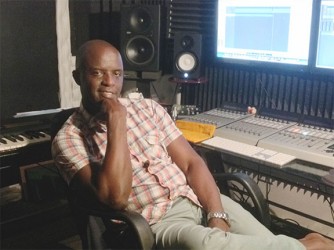From its humble beginnings on a kitchen table with a keyboard and sequencer, Kross Kolor Records has been transformed by founder Burchmore Simon into one of the country’s leading recording studios and promoters of local talent.
Kross Kolor Records was established in 1996 by Simon with the aim of promoting Guyanese artistes by exposing their talent to an international audience.
Some have called it “state of the art,” he joked recently during an interview with Stabroek News. He said even though it isn’t quite there yet, the studio is “very productive.”

Kross Kolor supports local artistes who have been signed by the label such as Jomo Primo, Adrian Dutchin, Vanilla, Big Red and Keep Your Day Job, among others, and acts from the label have won awards at the annual soca, calypso and road march competitions.
The studio has also engaged with artistes from the Caribbean region, such as Elephant Man, Macka Diamond and Popcaan.
The studio offers full production services, which included creating tracks, recording voices and mixing and mastering the final pieces. Simon said that prices for the studio range depending on what the artist needs; he said it can be anywhere between $45,000 to $60,000 per song but added that the more songs a person records, the cheaper the price becomes.
In 2012, Kross Kolor Records signed a worldwide digital distribution with German Publisher Ediciones La Palmera, which has publishing affiliates in Germany, Austria, Switzerland, Italy, the United Kingdom, Sweden and Norway, among other European countries. This distribution deal allows for local talent to be heard in international markets.
Emphasising the importance of the music and promoting local talent, Simon said an artist with talent but no capital has little to fear as it would simply not be an issue. “If an artist comes in here and I know that they can make it, I will sign them,” he said. By signing the artist to the label, all studio fees are waived and the studio is entitled to a percentage of the profits.
Simon explained that many of the artists under the label were signed because of their talent and not their money. Tennicia DeFreitas is one such artiste. After her demo wowed Simon, she was signed by the label and has recorded a number of songs. In the face of widespread piracy, Simon said that “it makes things difficult” and he lamented that “if we had a holistic market that was well developed, we, the artistes, would have a much better life.” Even though this isn’t the reality of the situation, Simon related that “we have found very creative ways to turn talent into something that can be marketed.”
According to him, the musicians depend on the profits they receive from live performances, whether locally or internationally. He said in the industry it is all about chances and opportunities and explained that sometimes “you just have to take a chance on someone” alternately he said “you just have to take an opportunity.” The success of Lisa Punch, he believes, is a testament to this.
Gavin Mendonca, band leader for Keep Your Day Job, said that the studio is very understanding where payment is concerned. According to him, “they establish a relationship with the artistes so they’re not really about the money, they’re about the music.” Continuing to endorse the studio, Mendonca said, “Before we went to perform in Suriname, they actually recorded three songs for us for free…. It’s almost as if you become family and the business side of it is almost insignificant.”
Simon said that the work he does in the studio really isn’t work to him. “…This is just what I do. I started from the age of six and I haven’t stopped. I have no regrets with the way I’ve lived my life. I studied music. I taught music. And I toured for 12 years with the band EC Connection, so it has been a continuous thing for me. I’m a trained music educator, classical guitarist, keyboard player, taught at the secondary level and at UG,” he said.





